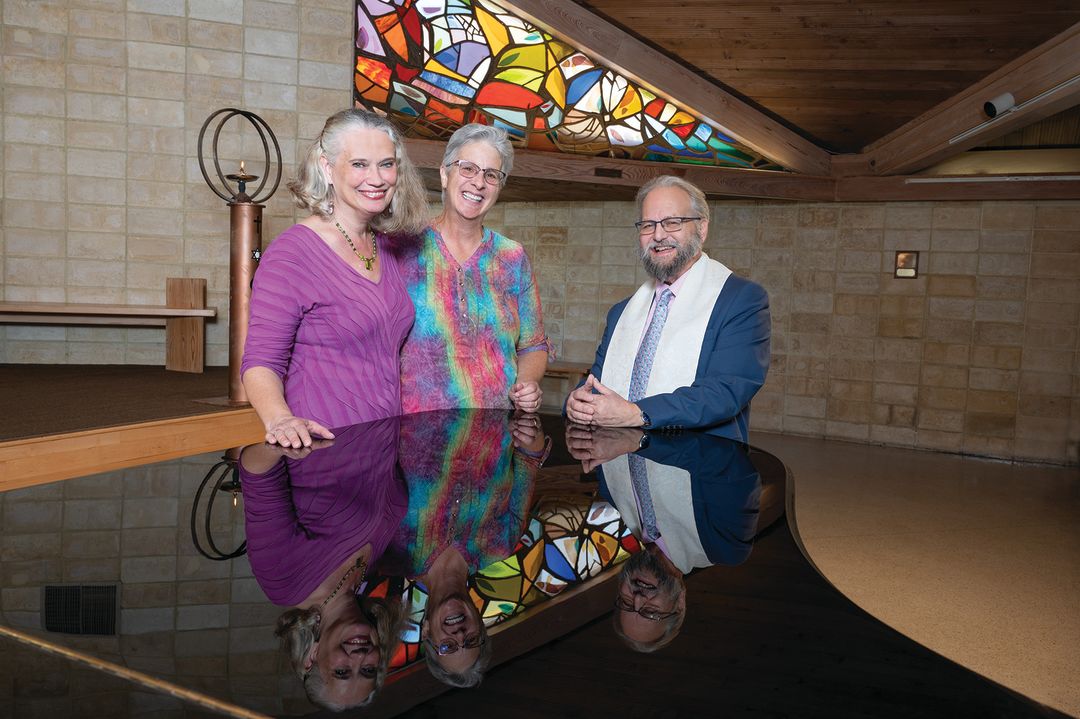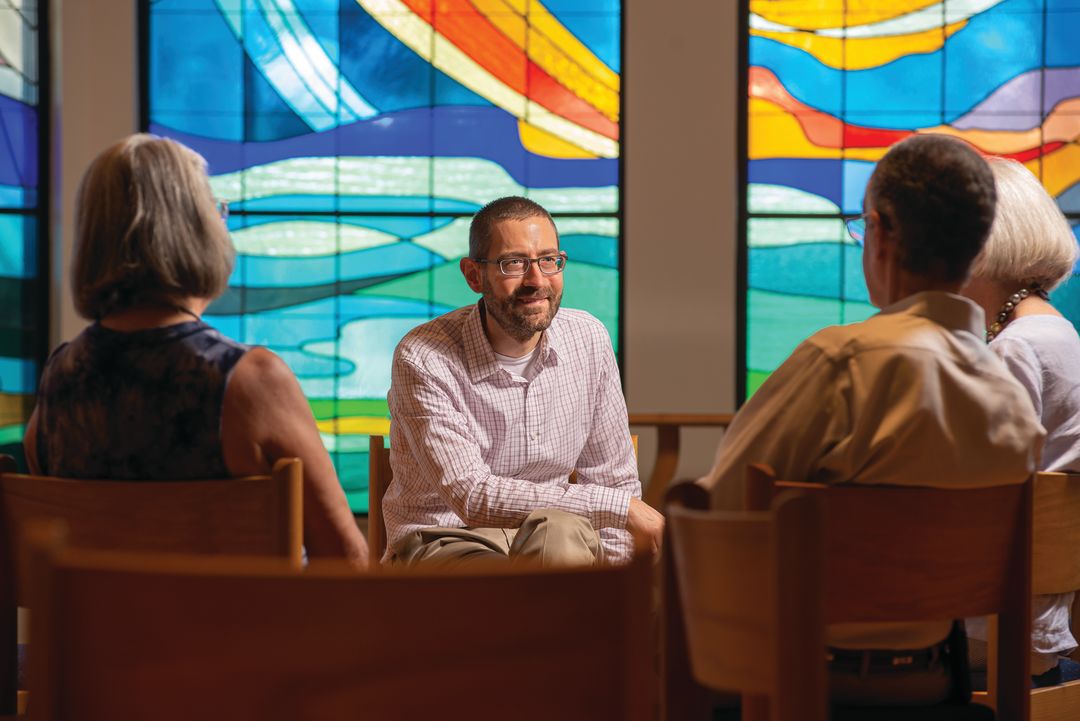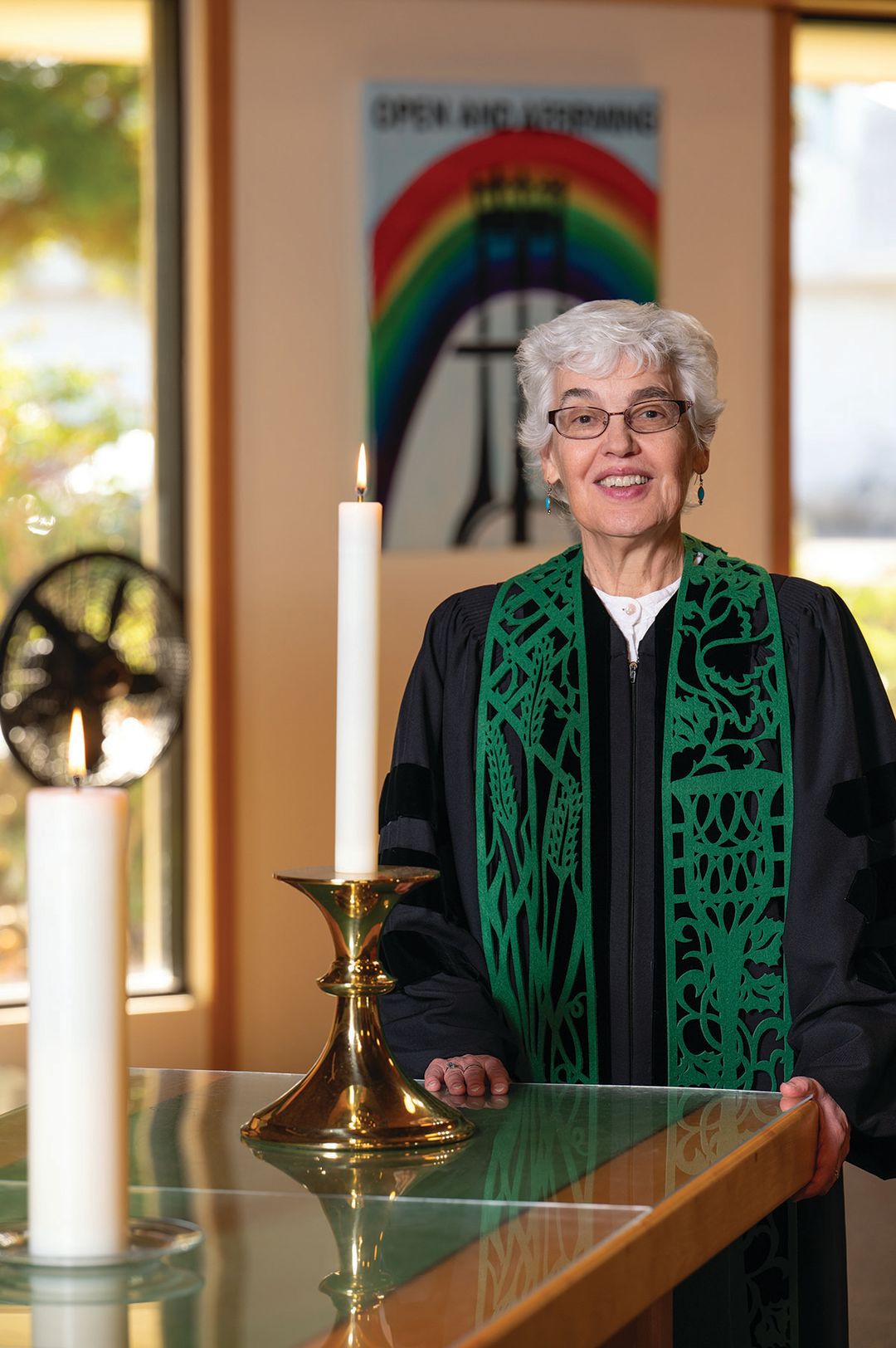Sarasota Churches Offer Sanctuary and Hope to LGBTQ Christians

Unitarian Universalist Church of Sarasota minister Rev. Jay Wolin with church director of finance and operations Roberta Druif (left) and her partner Doreen Dunn.
Image: Barbara Banks
What does queer Christianity look like in Sarasota?
We recently spoke to leaders of five local LGBTQ-affirming churches to learn about their histories, their congregations and the ways they’re maintaining hope amid anti-LGBTQ bigotry and political assaults. What we found was a wealth of compassionate, socially active congregations from a variety of denominations that go well beyond boilerplate promises of acceptance.
Rev. Lillie Brock, Church of the Trinity
7225 Lockwood Ridge Road, Sarasota, (941) 355-0847, trinitymcc.com
Denomination
The Metropolitan Community Church was founded in 1968 in Los Angeles by tormented Pentecostal pastor Troy Perry, who had been ousted by his congregation for being gay. “He heard God say to him, ‘Troy, get out of that bed and go tell my lesbian and gay children that I do not have stepchildren,’” says Brock. “The very first Sunday, he opened the communion table to anyone.”
Services
“We are non-doctrinal,” says Brock. “We do not have a set of contracts that we ask people to sign onto in order to be part of the church. In the season of Advent, we do very traditional things. I wear my vestments. But we switch that up all the time.”
Outreach
Multiple programs and partnerships support local teacher wish lists, Black-owned businesses, anti-racism initiatives and children with AIDS in Africa, in addition to LGBTQ support and legislative efforts.
“Perry said this church is going to be about Christian community and Christian social action,” says Brock. “He was a huge activist, so that’s been central to us from the very beginning. And Jesus was perhaps the biggest activist. Jesus relates to social justice.”
The Trans Memorial Garden
Last year, Church of the Trinity dedicated a trans memorial garden on its property. The project was inspired by a similar memorial erected in 2015 at a church in St. Louis.
“When I moved here, I realized that this is a place where issues surrounding queer people in general, but trans people in particular, can get swept under the carpet very easily,” says Brock. “In St. Louis, the garden was where we could gather whenever anything happened that was challenging to the queer community. We make sure that trans people who are killed are not forgotten.”
Maintaining Hope
“Today’s politics remind me of when I was in my 20s,” says Brock. “It’s hard for me to believe that we are here again. I hate that we spend as much time as we do trying to make people safe.
“The biggest piece of hope is that, statistically, both in Florida and around the country, 75 percent of Americans support queer people. It’s just that the few people who are in elected office right now do not.”
Rev. Jay Wolin, Unitarian Universalist Church of Sarasota
3975 Fruitville Road, Sarasota, (941) 371-4974, uusrq.org
Denomination
“The [American] Unitarians broke away from the Congregational churches in 1825 because they believe in the oneness of God, not the Trinity,” says Wolin. “The Universalists were anti-Calvinist. They believe there’s a loving God. In 1961, the two denominations merged to become Unitarian Universalist.
“I would not call us ‘Christian.’ I would say the majority of our people identify as religious humanists or agnostic. This doesn’t preclude the concept of a supernatural being, but it’s still up to us to make this a better world.”
LGBTQ Affirmation
“The belief in inclusion comes from both the Unitarian and Universalist sides,” says Wolin. “The church started ordaining people who identified as LGBTQ back in the 1970s and began educating our congregants. It’s one of the things we have always been about—a diversity of experiences, intentionality, inclusivity.
“Many LGBTQ people here grew up in a Christian religion that told them they were going to hell because of their sexual orientation. I personally think that’s abuse. We have seven principles. The first is the inherent humanity of every person.”
Maintaining Hope
“Being in community helps,” says Wolin. “It’s a balance of comfort, safety and coming together. And knowing that there are other people who will support you is hopeful in and of itself.”

Rev. Dr. Wes Bixby
Image: Barbara Banks
Rev. Dr. Wes Bixby, First Congregational United Church of Christ
1031 S. Euclid Ave., Sarasota, (941) 953-7044,
Denomination
Part of the Congregationalist tradition within the United Church of Christ, First Congregational was founded in 1953 and is a sister church to Sarasota’s Saint Andrew (see below). “United Church of Christ churches tend to be individual and autonomous,” says Bixby.
LGBTQ Ideology
“[First Congregational] voted to be open and affirming to LGBTQ individuals more than 20 years ago,” says Bixby. “A few years ago, we reflected on that and created our Inclusion Covenant. The Inclusion Covenant, along with our Racial Justice Covenant, form the backbone for the church.”
Services
“Sunday service here is fairly traditional,” says Bixby. “There’s an organ and at 11 a.m. is the full choir. For folks who grew up in the church, it can be a great comfort [to experience] some of the familiar rituals.”
Outreach
First Congregational’s justice initiative, Sarasota United for Responsibility and Equity (SURE), works to correct inequities affecting the poor and underserved within the local community.
“It’s not just about people coming here,” says Bixby. “We want to check on the community. We work with ALSO Youth and the St. Paul Food Pantry. We’re active in Family Promise. We’re good neighbors to the nursing home next door and the Jewish temple on the other side.”
Maintaining Hope
“Hope doesn’t exist outside of us,” says Bixby. “Hope is a gift God gives to us. Here, you can ground yourself in an inclusive, extravagant love. There are a lot of reasons to be afraid, and yet, there are places where people can gather, and there’s work to be done.
“There are people here who show up and are serving a church who lived through Stonewall and AIDS, thinking they’d never see gay marriage. It’s messy, but you keep doing the work that needs to be done. And you keep speaking out.”
Pastor Daniel Minor, Harvest Sarasota
3650 17th St., Sarasota, (941) 953-3559, harvestsarasota.com
Denomination
While Harvest is officially non-denominational, its roots lie in the Pentecostal traditions of Minor’s parents, Jim and Peggy Minor, who both began serving Sarasota’s Harvest Tabernacle Church in 1984.
“I grew up in more of a Pentecostal or charismatic tradition—speaking in tongues and all that,” says Minor. “We’d joke and say, ‘We don’t know if anybody’s getting into heaven, but if anybody’s getting in, it’s us.’”
LGBTQ Affirmation
“There are five kids in my family; two of them are gay and married,” says Minor. “You’d think that would be enough, but that was really the beginning of us asking hard questions. We were force-fed the premise that [LGBTQ existence] is sinful, that God frowns upon it. Somebody just told us that based on how they read certain scripture. But we ask, ‘Are they actually in sin? Or are we starting from a false premise?’”
After the 2016 Pulse Nightclub Shooting
Minor officiated the funeral of Sarasota’s Eddie Sotomayor Jr., who was killed at Pulse. “I actually went to [Booker High School] with Eddie,” says Minor. “We had some classes together and knew each other. His family asked me to do the funeral, and there were about 1,800 people there. I was scared to death. But I felt impressed upon my heart that I needed to apologize on behalf of the church to the gay community.
“I said through tears, ‘I’m sorry for the way the church has treated you. If Jesus walked the face of the earth today, I don’t think he would’ve treated you the way we treated you. God loves you just the way you are.’
“That seemed to resonate with people. That quote went through about 5,000 news streams in 24 hours. There was no going back.”
Minor’s actions affected church attendance and revenue. “We lost over half of the church,” says Minor. “Our income went down about 70 percent. But in the last five or six years especially, I’ve become more bold, more clear. And about six months ago, I changed all of our language to make [our LGBTQ-affirming ideology] very clear. I started to put up signs along the road: ‘This is an LGBTQ safe zone.’
“Now I address it every week in some capacity, in case there are people there who want to know if it’s true. And we’re beginning to build back up again. We’re at about 80 percent of what we were.”

Rev. Dr. Mary Alice Mulligan
Image: Barbara Banks
Rev. Dr. Mary Alice Mulligan, Saint Andrew United Church of Christ
6908 Beneva Road, Sarasota, (941) 922-7595, sarasotaucc.org
LGBTQ Affirmation
“I feel very strongly that the church has the right stance about just peace, about women in leadership, about the gay and lesbian welcome, and the sense of radical welcome,” says Mulligan. “God said, ‘Let us make humans in our image.’ God must have lots of images, too. Because if God wasn’t partly transgender, then God wouldn’t have made a person in their image transgender.”
Services
“We’re a small congregation,” says Mulligan. “We have about 40 or 45 on a Sunday morning during season. That’s after Covid, and we’re still trying to get people back into the pews. As is typical in Sarasota, we have a significant number of older folks, folks I would’ve called the ‘grand old liberals.’
“We have gay married couples and transgender folks within the congregation. We try to ask people their pronoun preferences. Some folks in the congregation are still working on that, and that’s OK. It’s hard. I’m 70. I’ve worked pretty hard at it. For someone who’s 85, God love ’em. Members of the queer community who hear people stumbling with pronouns, their attitude is also so welcoming. They’ll tell people, ‘I so much appreciate that you’re trying.’
“During Sunday services, we invite people to give brief prayer requests, joys or concerns. Once a man in his 80s got up and said, ‘I have a celebration. My grandson came out to us this week as transgender. So I have a new granddaughter. Her name is Kristen.’”
“Radical Inclusion and Extravagant Welcome”
“If Donald Trump walks in the door Sunday morning, he must be extravagantly welcomed, as much as an 18-year-old transgender boy,” says Mulligan. “Jesus didn’t say it’s going to be easy. Jesus said it’s going to be hellishly difficult. He said, ‘I’m going to give you each other, and I’m going to fill you with the Holy Spirit, and that’s going to be enough.’ And I cling to that.”
Maintaining Hope
“Hope is so crucial,” says Mulligan. “We die without it. I’m convinced that part of the reason that we have a church is not just to worship God (although that’s an important aspect), but we gather to remind ourselves that we’re not alone. As a community of faith, we matter. We’re doing something. We’re making a difference in the world.
“People want to be spiritually fed. They come to worship to get a better connection to God, to be filled with the Holy Spirit so we can go and do the social justice things that are needed.”



